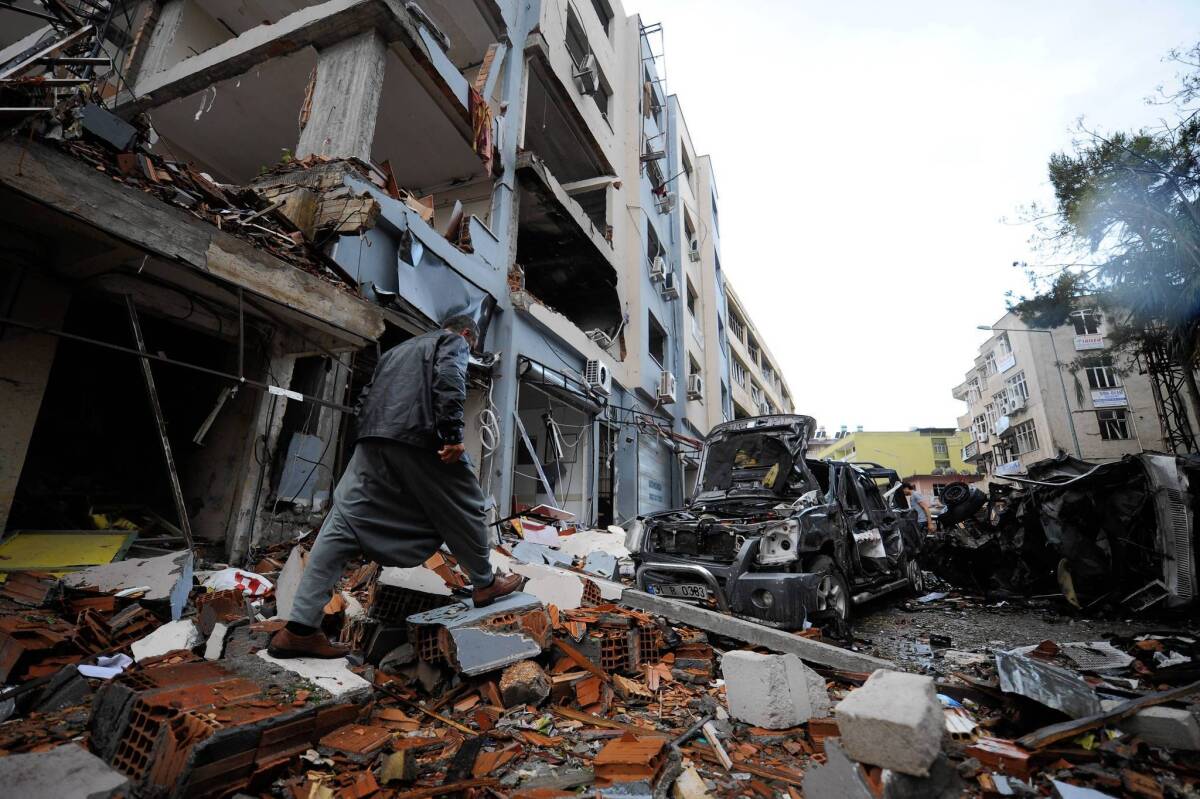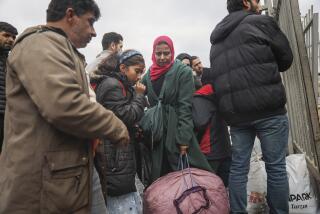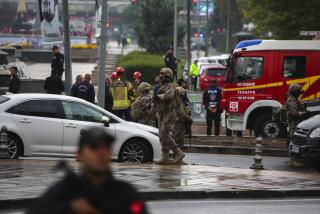Syria rejects Turkish accusations in deadly bombings

- Share via
BEIRUT — Syria on Sunday rejected Turkish charges that Damascus was behind a pair of devastating car bomb attacks in southern Turkey that killed 46 people and left scores injured.
The bombings provided a worrisome indication of how the civil war in Syria is increasingly spilling into neighboring countries. In another development, a Syrian rebel group on Sunday reportedly released four United Nations peacekeepers seized along the Golan Heights border with Israel. The abduction left Israeli officials concerned that such incidents could cause peacekeepers to pull out, leaving no buffer zone between the two countries.
The strikes Saturday in the southern Turkish town of Reyhanli stunned Turkey and exacerbated already-high tensions between the neighboring nations about the civil war raging in Syria.
Turkish officials publicly linked the bombings to Syria’s intelligence service — a charge denied Sunday by Omran Zoubi, the Syrian information minister.
“No one has the right in Turkey to issue arbitrary accusations against Syria regarding the bombings,” Zoubi told reporters in Damascus. “Syria has not and will not conduct such behavior.”
Turkish officials told reporters they had arrested nine Turkish citizens in the attack, and that an unidentified organization close to the Syrian secret service, the mukhabarat, was behind the strikes.
“We have established that the organization and assailants have links to the pro-regime mukhabarat organization,” Deputy Prime Minister Besir Atalay said.
The harsh invective from the two nations after the bombings has raised fears that Turkey could be dragged more directly into Syria’s civil conflict, which has gone on for more than two years.
Turkey has strongly supported Syrian rebels seeking to oust President Bashar Assad. The Turkish border zone, especially the southern province of Hatay, which includes Reyhanli, has become a logistics, training and arms-supply center for Syrian opposition fighters. The two nations share a more than 500-mile frontier.
The town of Reyhanli, situated a few miles from the border, is a hub for Syrian refugees and Syrian rebel activities.
Ankara’s active role in the Syrian civil war has been extremely controversial in Turkey. Although many Turks support their government’s decision to aid the Syrian rebels, others have assailed the policy as perilous and ill-advised.
In Hatay province, Turkish members of the Alawite Muslim sect have voiced strong support for Assad, a fellow Alawite. Some Turkish opposition parties also have opposed their government’s role in the Syrian conflict.
Updated numbers from Saturday’s twin bombings put the death toll in Reyhanli at 46, with more than 50 still hospitalized, including several in critical condition. Authorities said two bomb-laden cars were involved.
Meanwhile, a Syrian rebel group said it released the four U.N. peacekeepers, all of them Filipinos, at the Israeli border. The four were unharmed, according to statements by military authorities in Manila, the Philippine capital.
A Syrian rebel group, the Yarmouk Martyrs Brigade, said the four had been held for their own safety amid shelling and clashes in the area between Syrian troops and rebels.
It was the second time in recent months that Philippine peacekeepers had been seized by rebels in the increasingly volatile Golan. The seizures have alarmed authorities in Manila, who say they are considering withdrawing their U.N. contingent in the Golan.
Currently, about 1,100 peacekeepers from the Philippines, Austria and India monitor the cease-fire line.
“We want them to stay,” said Israeli Foreign Ministry spokesman Yigal Palmor. “They can’t prevent the war in Syria, but they have an important role to play. If they disappear, it will just be Israel facing whatever or whoever is on the other side.”
The Israeli military said late Sunday that the freed peacekeepers had not entered Israel and it had no information on their whereabouts.
Times staff writer Edmund Sanders in Jerusalem contributed to this report.
More to Read
Sign up for Essential California
The most important California stories and recommendations in your inbox every morning.
You may occasionally receive promotional content from the Los Angeles Times.













